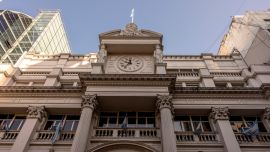Argentina's Central Bank's net reserves have fallen into record negative territory, intensifying investor concerns about a possible run on the financial system in the midst of an election cycle.
Net reserves, the difference between the Central Bank's assets and its short-term liabilities, fell to US$6.45 billion, the lowest negative level in history, according to a research note by Martin Rapetti, executive director of Buenos Aires-based consultancy Equilibra.
While Rapetti said the monetary authority currently could handle a significant drop in private-sector dollar deposits, he also warned that investors are nervous.
"The market refocused its attention on the risk of repayment of dollar-denominated bank deposits," Rapetti wrote. "There are fears of a massive withdrawal which could further deplete the Central Bank's liquid reserves. In such a context, pressure on foreign exchange markets would lead to instability and even higher inflation."
A Central Bank spokesman said that the monetary authority "proved to have liquidity to face the country's financial commitments" and that "market calculations do not reflect its financial position". The Central Bank does not publicly disclose net reserves figures, nor daily dollar sales in foreign exchange markets to prop up the peso.
Net reserves have fallen by about US$14 billion so far this year, affected mainly by a drought cutting agricultural dollar revenues by almost half in early 2023. Payments to private creditors and the International Monetary Fund (IMF) help explain some of the decline. Import financing and foreign exchange intervention are other key factors.
Some analysts believe the Central Bank is tapping into savers' deposits to intervene in foreign exchange markets, a highly unusual move.
"It is very likely that they are using embedded dollars from people's deposits,because we don't see movements in gold reserves. It's hard to know this because money is fungible. But they can always manage dollars," said Juan Pablo Rotger, an analyst at Banco Mariva, in a telephone interview.
Argentina’s elections could put further pressure on the bank's reserves. Four years ago, a shocking primary election result triggered financial panic when Argentines withdrew more than 40 percent of dollar deposits in a three-month period. Today, the financial system has less than half of the dollar deposits it had in 2019, but an unexpected outcome could again trigger another wave of withdrawals.
Carlos Melconián, a leading economist who has placed his proposals at the disposal of all presidential candidates, says the Central Bank's balance sheet and the stability of the peso depend on the government reaching a new staff-level agreement with the IMF. Talks between the IMF and the Argentine government on reworking the US$44-billion programme have dragged on for months.
"The Central Bank is dependent on closing a deal with the IMF to avoid a devaluation before the elections. We don't know if they are using reserve requirements from the financial system, the Basel Bank or deposit insurance, because money is fungible."
by Ignacio Olivera Doll, Bloomberg




















Comments